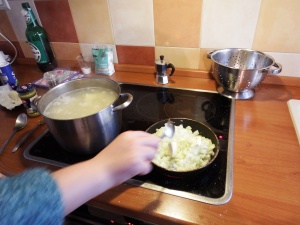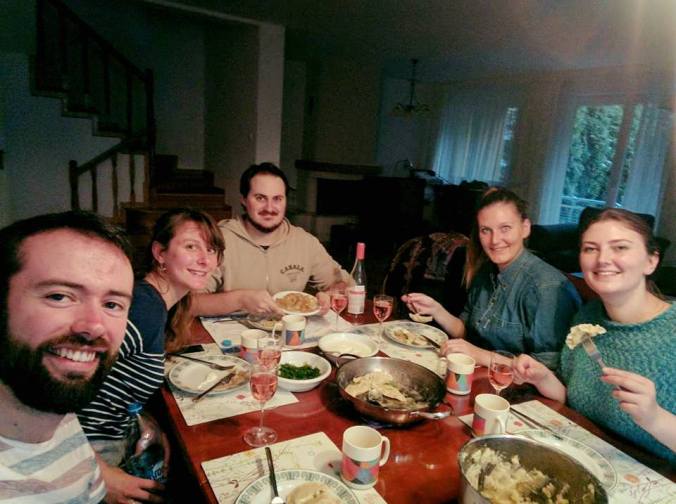Political scientists and academics seem to spend as much time explaining what something is as they spend explaining what it shows or does. To do this, they often also have to state what something is like and therefore also what it is not. The problem of defining phenomena keeps coming up in lectures, especially when it comes to the question of identities. At the most mundane it might just mean that if you are if you are right you are not left, if you’re Conservative you are implicitly not Labour. However, a recent course on national identities really got me thinking: what if we didn’t define ourselves by our differences?

Pierogi/Vareniki-making with Olena: tasty tuition in another culture!
I’m British, not French. I’m Belgian, not Dutch.
Nations haven’t existed that long. In fact, before the 19th century, there were ‘peoples’ in some respects, but the modern nation, the sovereign nation, only really came into being with the French Revolution in 1789. In many ways, the nation is (like some believe religion), a means of controlling people and of legitimising power. We form community with shared values; a shared patronage and a shared future. However, what struck me in our recent “construction des identités nationales” course was that nations define themselves by their differences.
Of course, this can create a lot of banter, and there are countless jokes between many nations who find the other’s bizarre quirks amusing – but what if it’s harmful?
If we’re so different how can we work together?

Onions: perhaps the most cross-cultural vegetable ever
Whilst it sometimes seems necessary, for instance in politics, defining by our differences can often be barrier to recognising common aims and common ground. By establishing the other as the complete contrast to us, recognising only either perfect matches in opinion and outlook, or stark difference, we close off our community (our nation) and build up a protectionist wall.
When we define ourselves by our nationality, and implicitly or even explicitly contrast ‘us’ with ‘them’ across the border, we close ourselves off to recognising what we share or how we can work together to achieve both our aims.
Too close for comfort?

Enjoying the varenikis of our labour…
If the results of recent national referenda and elections are anything to go by, nations are stronger and more protectionist than ever (Moldova, Hungary, UK, USA, to name a few). We are increasingly isolating our communities, building walls to protect ‘our values’ and ‘our interests’, trying to keep out the threat if the ‘other’ who is, by definition different.
The College of Europe is a real mix of cultures and nationalities. Here, 131 students from 34 countries are juxtaposed against one another. Surely, this should be a still pot, magnifying small differences and amplifying asymmetries. In a melting pot of differences, where the common language between two people might not be either’s first, or even the second of their repertoire, how can we expect to communicate effectively?
And yet, here more than anywhere else, I feel united. Yes we share a common understanding. We’re all studying the same overall Masters for one thing. But it is deeper than that. The day of our first opening ceremony saw our Vice Rector tour the room, asking different nationalities to stand up: hardly any were sitting together in closed, national groups.
I think that by not just exposing people to difference, but by creating an environment where people have to interact and talk, you come to realise that we’re not that different after all. And where there are differences, they are more something to celebrate than fear. European integration won’t succeed unless we have greater exchanges between countries and abandon the restrictive idea of nations being defined by their differences. I was never fortunate enough to do an Erasmus exchange, but from what I’ve seen here, it should be more common.
The world seems a bit scarier than it was at the start of 2016. But it doesn’t have to go down the route of fragmentation into blocs defined by their great differences. I’m a forever-optimist (and perhaps misguided), but maybe there could be new opportunities for greater dialogue arising in the world, if we just try to stop seeing differences and celebrate more a common humanity.
varenyky!! ^_^
very good post, Katie
LikeLiked by 1 person